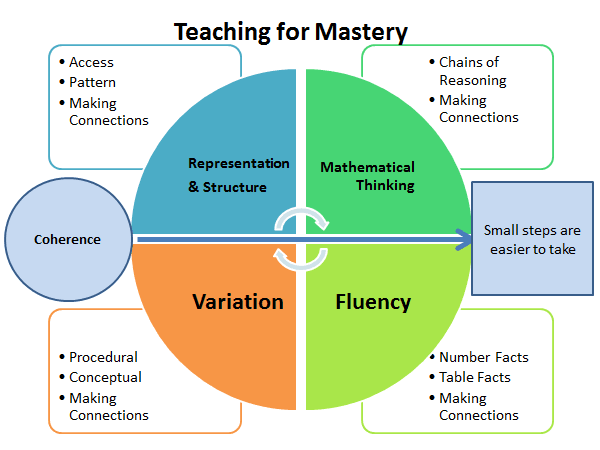Teaching for Mastery
Future mathematical learning is built on solid foundations which do not need to be re-taught. A central component in the NCETM/Maths Hubs programme to develop Mastery Specialists has been discussion of Five Big Ideas, drawn from research evidence, underpinning teaching for mastery.
The essential idea behind mastery is that all children need a deep understanding of the mathematics they are learning so that there is no need for separate catch-up programmes due to some children falling behind. Children who, under other teaching approaches, can often fall a long way behind are better able to keep up with their peers, so that gaps in attainment are narrowed while the attainment of all is raised.
The National Centre of Excellence in Teaching Mathematics (NCETM)
have identified four main principles for teaching a mastery approach:
-
Variation

-
Fluency
-
Mathematical thinking
-
Representation and structure
For more information on teaching for mastery, including lesson videos and professional development materials, see the NCETM Mastery pages.
You can also see case studies done by the Solent Maths Hub here.
One of our headteacher advocates Phil Thomas at Halterworth Primary School has created a testimonial video sharing their experience with the Solent Maths Hub.
Phil has left his contact details at the end of the video, please feel free to contact him and he will be happy to share his opinions and experience in becoming a Mastery Specialist School.
This video has been created by Lisa Nicolson and her staff at Haylands Primary School. Lisa is a Headteacher Advocate and Kelly Diamond, year 6 teacher, is a Mastery Specialist teacher.
WHAT IS THE TEACHING FOR MASTERY PROGRAMME?
The NCETM and Maths Hub have been running the national Primary Teaching for Mastery Programme since 2015, and more recently secondary schools have also become involved with teaching for mastery.
In the first year, 136 schools from all over England each nominated a teacher to begin training as a Primary Mastery Specialist. The teachers were given a year's intensive training in the principles of teaching for mastery, underpinned by its 'Five Big Ideas' and in professional development leadership. In the following year, they further developed teaching for mastery in their own schools and they shared the approach with neighbouring schools by leading Teaching for Mastery Work Groups.
In each subsequent year, a new cohort of Primary Mastery specialists has been trained, increasing the pool of specialists leading Work Group of local schools. By summer 2019, more than 5,000 schools have participated in the Teaching for Mastery Programme. Hundreds of thousands of children are now benefitting from a changed experience of maths learning at school. The programme is open to all state-funded schools in England.
Secondary Mastery Specialists are now also being trained, and hundreds of secondary schools are starting to develop teaching for mastery approaches, especially at KS3.
HOW CAN SCHOOLS GET INVOLVED WITH TEACHING FOR MASTERY?
Each year, there are opportunities to train as a Mastery Specialist (Primary and Secondary) or to join a Teacher Research Group. We also run the Mastery Readiness Programme (Primary) which supports schools who need a structured approach before joining a Teacher Research Group.
If you re interested in being part of a Teacher Research Group, Training to be a Mastery Specialist or joining the Mastery Readiness Programme (Primary) please contact us on info@solentmathshub.org.uk
